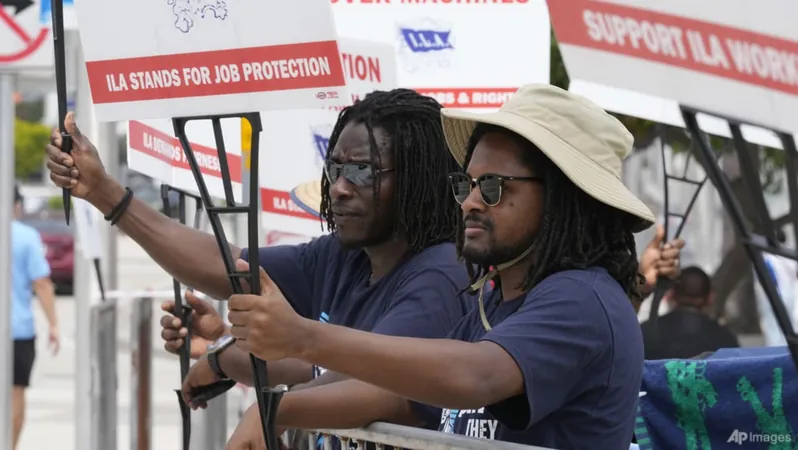
Breaking News: US Port Workers Strike Ends with Historic Wage Increase!
2024-10-04
Author: Mei
NEW YORK – In a significant turn of events, United States dockworkers and port operators have swiftly agreed to a tentative deal, bringing an immediate end to a paralyzing three-day strike that disrupted shipping operations along the US East Coast and Gulf Coast. This announcement was made on Thursday, October 3rd, sending waves of relief across the nation.
The newly reached agreement includes a staggering wage increase of approximately 62% over the next six years, as reported by sources familiar with the negotiations. This translates into average hourly wages rising from $39 to around $63, a crucial victory for the hardworking labor force. The International Longshoremen's Association (ILA) had initially advocated for an even larger increase of 77%, while the employer group, United States Maritime Alliance (USMX), previously offered nearly a 50% hike.
This strike represented one of the largest work stoppages in the port sector in nearly half a century, leading to the halting of container ship unloadings from as far north as Maine down to Texas. This situation was causing widespread shortages of essential goods, including everyday items such as bananas and auto parts. By Wednesday, at least 45 container vessels were lingering outside key ports, unablе to offload their cargo, intensifying chaos in supply chains that were already fragile after recent hurricane impacts.
In a collective statement, the port operators and union leaders declared that they would extend their master contract until January 15, 2025, allowing further negotiations to address outstanding issues, while also emphasizing that all current job actions would cease immediately.
However, pressing concerns remain regarding automation within the port operations—an issue that threatens jobs according to the union. Union leader Harold Daggett has called out major companies like Maersk and APM Terminals for not addressing their demands to halt automation projects that could lead to significant job losses.
President Biden’s administration has played a crucial role in mediating this situation, siding with the union and urging port employers to enhance their offers given the lucrative profits observed in the shipping industry since the COVID-19 pandemic. Biden remarked that this tentative deal "represents critical progress towards a strong contract," highlighting that collective bargaining works.
Sources indicate that the White House was deeply involved in negotiations leading up to this deal. Chief of Staff Jeff Zients even facilitated an early morning meeting with CEOs from shipping companies to stress the urgency of reopening ports, especially as southeastern states face severe supply shortages due to recent natural disasters.
While the immediate end of the strike is good news for the economy, analysts have warned that the US could have faced monumental losses of around $5 billion each day if the work stoppage continued. The strike affected 36 vital ports, including major hubs such as New York, Baltimore, and Houston.
Both the National Retail Federation and National Association of Manufacturers expressed relief at the resolution, praising it as a collective victory that helps to preserve jobs and stabilize supply chains. Economists believe that while initial consumer prices may not spike due to recent surges in shipments, any extended strike would ultimately lead to increased food prices, creating a ripple effect throughout the economy.
Stay tuned for further updates as negotiations continue and the deal is finalized, reshaping the future of maritime labor in the US!
 Brasil (PT)
Brasil (PT)
 Canada (EN)
Canada (EN)
 Chile (ES)
Chile (ES)
 España (ES)
España (ES)
 France (FR)
France (FR)
 Hong Kong (EN)
Hong Kong (EN)
 Italia (IT)
Italia (IT)
 日本 (JA)
日本 (JA)
 Magyarország (HU)
Magyarország (HU)
 Norge (NO)
Norge (NO)
 Polska (PL)
Polska (PL)
 Schweiz (DE)
Schweiz (DE)
 Singapore (EN)
Singapore (EN)
 Sverige (SV)
Sverige (SV)
 Suomi (FI)
Suomi (FI)
 Türkiye (TR)
Türkiye (TR)